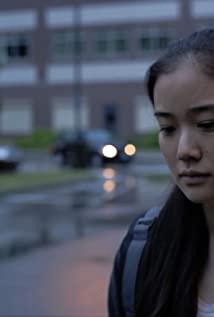This is a typical youth movie with all the elements it should have, such as piano, white shirt, long hair, earphones, bicycle, kite, sunshine, and wheat fields. However, because of Shunji Iwai, it will not be so simple.
In fact, Iwai's films have always taken the path of sadness and beauty before, like "Love Letter", which gave us the most memorable winter romance. But the sadness of "Lily Week" has a destructive beauty. It is not the kind of sadness that reminisces about the youth after getting old, or the sadness that I suddenly realize after missing many years, but a kind of soreness and powerlessness that penetrates into the bone marrow. .
After watching "Lily Week", I went to the balcony and took a deep breath, then looked up at the sky, complete and clear. But I know that there are broken souls wandering in a corner under the boundless sky.
1. Wheat Field and White Shirt
The most striking scene on the poster is Hasumi in a white shirt standing in the endless green wheat field listening to music. This picture alone reveals the beauty of Lily Zhou's music, clean, confused, and aimless. I, like a lot of people, got interested in this movie because of its poster.
The green wheat fields quiver gently under the wind, and the youthful, fragile and beautiful are no more than that. And Hasumi, who wears headphones, came here to escape painful memories. Only here can he listen to music quietly, regardless of the messy family and the bullied body. His sweat wetted his white shirt in the scorching sun. His face was silent and exhausted.
And Hoshino, this good boy who was an excellent student from the beginning, handsome and tall, dressed in a white shirt, reminded me of Kashiwahara Chong in "Love Letter" in a trance. But after that trip to Okinawa, he was no longer dressed in white. It was his declaration of a complete break with the past. What I don't quite understand here is that Iwai doesn't seem to explain how the Hoshino family fell. The transformation of Hoshino's psychology can be explained by the distortion and influence of the impermanence of life and death on a boy's once well-protected mind, but this does not seem to have much to do with the fall of his family. In "The Catcher in the Rye", Salinger expressed his wish through the mouth of the hero: "I just want to be a Catcher in the Rye, you know, watching from afar in the Rye Children playing. If they accidentally run to the edge, I will stop them." But there is no watchman in the wheat field here, it can only watch the teenager go further and further on the wrong road of youth.
In any case, in the latter part of the film, we also saw Hoshino standing in the wheat field, he also wore headphones, and the same Lily Zhou was singing. Unlike Hasumi's quiet listening, Hoshino howled loudly. In my opinion, Iwai seems to want to create a special atmosphere of "the audience is Hoshino", so the audience can only hear Lily Zhou's singing and faint roars. In my opinion, this way of handling is much better than simply watching Hoshino shouting on Hiro. This vague approach not only retains the implicit style that runs through the movie from the beginning, but also allows us to glimpse the undercurrent in the quiet and ethereal. .
In short, after this, I will never see Hasumi, Hoshino and others riding a bicycle and eating udon noodles on the bridge again.
All that was frozen in the wheat field.
2. There are two girls in Debussy and the Girl
's Tale, one is called Tsuda and the other is called Kuno. It is worth pondering that their names can not help but think of the wet fragrance of wheat fields.
Kuno is the first love of all teenagers' dreams: long hair that is shawl and smooth, silent and gentle eyebrows, and hands that can play the melodious piano sound. She often plays Debussy alone in the piano room. The sun shines on the piano and her body from the window. The dust and particles in the room are flying in the light. The sound of the piano like spring water spreads in the empty corridor. She quietly impact. Hasumi listened quietly outside the door, breathing in the freshness of the beautiful musical notes, which seemed to be the only clear oxygen left in his filthy life. But Kuno's tranquility is not about her alone. Although she is unwilling to join forces and go with the flow, she can't resist those vicious gazes and rejections, and she can't stop herself from going into danger.
So there was the scene that I couldn't accept the most, Hoshino asked Hasumi to take Kuno to their abandoned warehouse. Everyone knows what this request means, but Hasumi is so cowardly that he guides his beloved girl to the most cruel harm, and what is even more piercing is that Hoshino has also poured out his silent love for Kuno. Iwai made this scene extremely beautiful, intertwined with morbid light and shaky shots, flying feathers, and obscenity voices, and the vicious girl aimed at Kuno was screaming while looking out the window. Hoshino was wearing a black jumper with no face. With an expression on his face and smoking silently, Hasumi wiped away tears outside the door.
I was literally speechless. I can scold Hasumi's cowardice, the perverted behavior of a vicious girl, and Hoshino's evil transformation. But I can't tell. According to Baudelaire, evil is beauty. When evil reaches its extreme, there is a sense of beauty. Beauty is used to set off evil. The more beautiful it is, the more evil it is. It's just that I'm not used to it, I'm not used to this way of expression, I can't express my emotions directly, all my doubts and resentments are held in my chest, as if a strong hand blocked my mouth, choking to tears.
Then, for many days, Kuno didn't come to class. When I almost thought she would not come back, she came back, shaved all her hair, came back to class, just touched her bald head slightly shyly, and then calmly opened the book. I was dumbfounded. Perhaps, many things are not as fragile as we think.
And Tsuda was even more tragic. She is one of the proofs of Hoshino's sin. And the scene where Hasumi escorts her home is the most intense part of the whole movie. There is no musical foil, no dialogue, only insects and wind. Tsuda grinds the money from humiliation with his feet and beats Hasumi with his schoolbag—this kind of beating is different from the hysterical beatings in domestic film and television dramas. Pain and anger, Iwai doesn't know how much better than the domestic directors. Then she walked into the river beside the ridge, and the water was turbid. Back home, she wet herself with a shower in the garden, wanting to wash away the dirt from her body, the same quiet and silent, and on the other side of the flower wall, is the silent Hasumi.
Tsuda likes Hasumi, so she rejects Sasaki who can protect her from Hoshino's control. But Hasumi flinches, he doesn't have the strength to take on the love - I'm not sure if it's love, because I wonder if the word exists in this movie. In other words, Lian Jian is no longer able to give his feelings. He doesn't know how to like, how to be liked, all he wants to do is to avoid listening to Lily Zhou alone. Therefore, Tsuda learned to fly a kite in the wilderness, flying high in the blue sky, and then falling.
So far, Debussy's piano never played again.
3. There is still another way to escape from obsession and Qingmao Lianmi
, and that is the Internet. On BBS, he is called obsessed. As a loyal supporter of Lily Zhou, he and others with the same hobby exchanged their interpretations and thoughts on Lily Zhou on the dark screen. It is only here that Hasumi can find confidence and joy, and it is only here that someone will listen to his words and express their approval and appreciation. This time, it seems that Lotus sees the truth.
Obsessive meets blue cat. Qing Mao seems to be a novice, he has just started listening to Lily Zhou. So two teenagers who didn't know each other used white characters to express their love and obsession with Lily Zhou, and regarded each other as confidants in their mutual communication.
I originally thought that this could be a warm and comforting line in the film, but in the end, it still inevitably went to the ashes.
Fascinated and Blue Cat meet at Lily Zhou's concert, and the recognizable sign is a green apple with Blue Cat written on it. Hasumi arrived at the concert excitedly, with tickets in his hands, he was very excited. When he lost all hope, he still yearned for the arrival of a true friend, and he regarded the green cat as a life-saving straw when it sank rapidly. But he ran into Hoshino. Hoshino asked Hasumi to buy a Coke for him and to keep the tickets for him. He also handed him a blue apple and told him that if the person who came was a girl, he would report to him, or else he would whatever. Hasumi went to buy Coke in a trance, but the crowd was so crowded that he couldn't reach Hoshino. He saw Hoshino smiling and tearing up his tickets in the distance, then turned and disappeared. At this time, Hasumi looked down at the green apple with a black Blue Cat on it.
The final explosion was to be expected. It was still very quiet, the green apple with the utility knife was stained with blood, and Hasumi's face was still so innocent. But the back of him turning away reminds me of Hoshino. He killed Hoshino, but became another Hoshino.
As expected, Blue Cat and Fascinated can only live in the virtual world.
4. Lily Zhou and Cang Qiong
Lily Zhou are the hidden protagonists of the movie. She appears in the movie all the time but never shows up. She has an ethereal singing voice and an intoxicated and lazy voice. I can't understand Japanese, but I can feel the entanglement of Lily Zhou's singing.
In the story, Lily Zhou is portrayed as a myth, a religious totem, representing the purest beauty and clarity, and obsessed and Hasumi called it "the sky". Regarding the expression "sky", the translations in different versions are also different, and some are translated as "ether". Ether is a virtual medium that can be seen everywhere in physics writings. I prefer the translation of "sky", which is more poetic. For example, it was mentioned earlier that Debussy's music is also one of the representatives of "The Firmament".
Because the reality is too dark, Hasumi seeks something that is not polluted to bear their fantasies, and Lily Zhou is such a carrier. Because of her legendary experience, because of her maverick, because of her psychedelic mystery, Lily Zhou can be the most perfect symbol in their imagination. And those heroin-like music with a dreamy murmur and a fog-like atmosphere have become the best way for teenagers to get rid of the heaviness of reality. They use Lily Zhou's music to make themselves empty and float themselves, but their lives themselves are nothingness - no goals, no ideals, no light. Become more emptier because of emptiness, and again and again until life is tortured to the point of dying.
The so-called sky is nothing but an excuse to reject reality.
This is not our life. So it seems so incomprehensible. In other words, such a life could not have existed, it was just a work made by Iwai who concentrated all the episodes about the crimes of the youth into one movie and shot it with the most beautiful and quiet technique. But it's still shocking to me. I'm thankful that our world doesn't have to be so oppressive, so heavy, so hopeless.
I remember someone saying to me after watching it, "This movie is ugly." Then he added, "It's not that it's ugly, it's just ugly." I think I understand what he means. Really, ugly. Even in retrospect, I feel that it is very difficult, because it is really difficult.
The sky of Hasumi and Xingye shattered in his own hands.
Our sky, fortunately, is still clear.
View more about All About Lily Chou-Chou reviews









